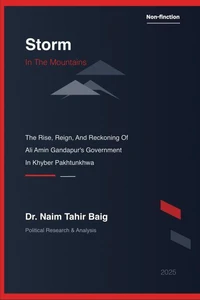NUCLEAR WEAPONS IN SPACE: A HIDDEN HISTORY AND MODERN THREATA Groundbreaking Investigation into Humanity's Most Dangerous ExperimentIn the summer of 1962, a nuclear weapon one hundred times more powerful than the Hiroshima bomb detonated 400 kilometers above Earth, creating artificial auroras visible in Hawaii and crippling satellites across the Pacific. This was Starfish Prime-just one episode in a secret Cold War arms race that transformed space into a nuclear battlefield and nearly derailed humanity's cosmic destiny.
Dr. Naim Tahir Baig's meticulously researched exposé reveals the shocking untold story of nuclear weapons in space, from the early atmospheric tests that created artificial radiation belts lasting decades to the ambitious Project Orion spacecraft powered by atomic explosions. Drawing from newly declassified documents, scientific studies, and expert interviews, this book separates Cold War realities from Hollywood myths while examining the genuine perils these weapons pose to our satellite-dependent civilization.
Nuclear Weapons in Space explores how both superpowers secretly conducted dozens of high-altitude nuclear tests, contaminating Earth's orbital environment and threatening space exploration for generations. The book reveals the hidden environmental consequences of these experiments, including enhanced Van Allen radiation belts, satellite casualties, and electromagnetic pulses that disrupted communications across vast regions of the Pacific.
As tensions escalate in 2025 with reports of Russia developing nuclear-powered anti-satellite weapons, Dr. Baig's analysis becomes urgently relevant. The book examines how space-based nuclear detonations can create electromagnetic pulses spanning continents, artificial radiation belts persisting for decades, and debris fields that render entire orbital regions inaccessible. Unlike terrestrial nuclear weapons with geographically limited effects, space nuclear weapons threaten the fundamental sustainability of space exploration itself.
Through compelling narratives of near-miss incidents, cover-ups, and scientific discoveries, the book challenges popular misconceptions while presenting sobering evidence of how the militarization of space through nuclear weapons endangers not only international security but humanity's future beyond Earth. Dr. Baig's work serves as both historical documentation and urgent warning, demonstrating that the choices we make today will determine whether future generations inherit a space environment suitable for exploration or a radioactive graveyard of our own making.
Essential reading for scholars of international relations, space policy experts, and anyone concerned about the intersection of nuclear weapons and space exploration in an era of renewed great power competition.
NUCLEAR WEAPONS IN SPACE: A HIDDEN HISTORY AND MODERN THREATA Groundbreaking Investigation into Humanity's Most Dangerous ExperimentIn the summer of 1962, a nuclear weapon one hundred times more powerful than the Hiroshima bomb detonated 400 kilometers above Earth, creating artificial auroras visible in Hawaii and crippling satellites across the Pacific. This was Starfish Prime-just one episode in a secret Cold War arms race that transformed space into a nuclear battlefield and nearly derailed humanity's cosmic destiny.
Dr. Naim Tahir Baig's meticulously researched exposé reveals the shocking untold story of nuclear weapons in space, from the early atmospheric tests that created artificial radiation belts lasting decades to the ambitious Project Orion spacecraft powered by atomic explosions. Drawing from newly declassified documents, scientific studies, and expert interviews, this book separates Cold War realities from Hollywood myths while examining the genuine perils these weapons pose to our satellite-dependent civilization.
Nuclear Weapons in Space explores how both superpowers secretly conducted dozens of high-altitude nuclear tests, contaminating Earth's orbital environment and threatening space exploration for generations. The book reveals the hidden environmental consequences of these experiments, including enhanced Van Allen radiation belts, satellite casualties, and electromagnetic pulses that disrupted communications across vast regions of the Pacific.
As tensions escalate in 2025 with reports of Russia developing nuclear-powered anti-satellite weapons, Dr. Baig's analysis becomes urgently relevant. The book examines how space-based nuclear detonations can create electromagnetic pulses spanning continents, artificial radiation belts persisting for decades, and debris fields that render entire orbital regions inaccessible. Unlike terrestrial nuclear weapons with geographically limited effects, space nuclear weapons threaten the fundamental sustainability of space exploration itself.
Through compelling narratives of near-miss incidents, cover-ups, and scientific discoveries, the book challenges popular misconceptions while presenting sobering evidence of how the militarization of space through nuclear weapons endangers not only international security but humanity's future beyond Earth. Dr. Baig's work serves as both historical documentation and urgent warning, demonstrating that the choices we make today will determine whether future generations inherit a space environment suitable for exploration or a radioactive graveyard of our own making.
Essential reading for scholars of international relations, space policy experts, and anyone concerned about the intersection of nuclear weapons and space exploration in an era of renewed great power competition.

 , qui est-ce ?
, qui est-ce ?